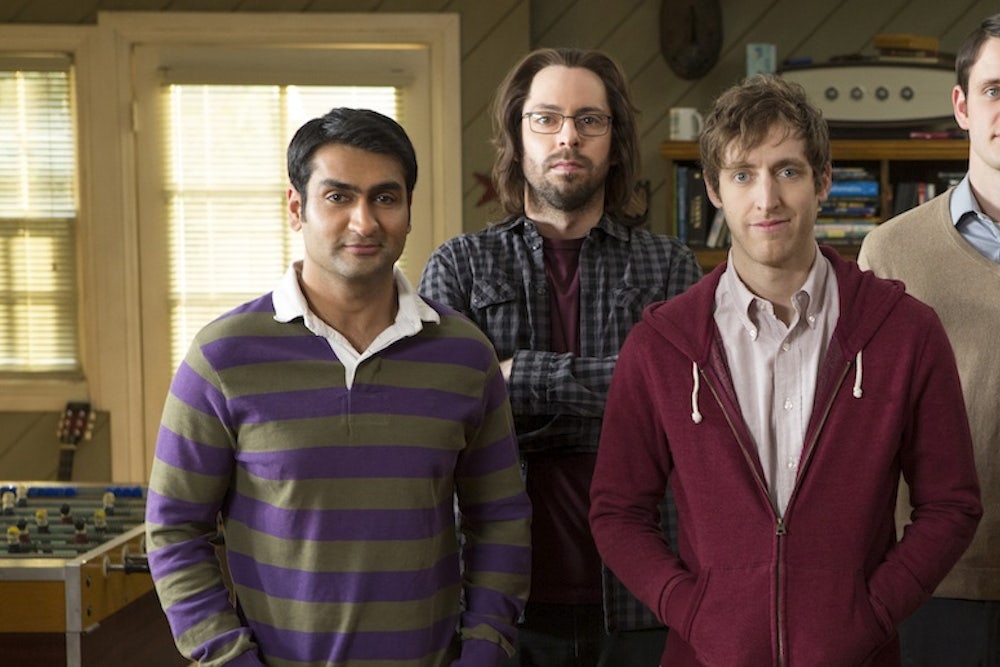“Every party in Silicon Valley ends up like a Hasidic wedding,” says one character on Mike Judge’s new HBO show “Silicon Valley” as the camera pans to reveal a cluster of men on one side, a group of women on the other. This is exactly what anyone who’s been following trend stories about the brogrammers and world-changers of the tech industry would expect from a Palo Alto soiree, and there’s something satisfying about seeing the stereotype come to life. But what’s most interesting about the show is the way Judge doesn’t just animate this trending topic with a series of tropes: hoodies and quinoa and apps that help men locate the nearest woman with erect nipples. He manages to go deeper than the stereotypes in order to reveal the human beings underneath, a cadre of young men who are both extremely privileged and incredibly anxious, and honestly just trying to make something cool and useful.
The show focuses on a small group of code-writing wannabe entrepreneurs who live together in a house owned by a former programmer, a schlubby, older-brother figure who sold his startup years ago and hasn’t done much since. The landlord deems his glorified frat house an “incubator” and lets the young programmers live there in exchange for a 10 percent stake in anything they create. A few of the guys have day jobs at Hooli, a giant tech company that claims to be “transforming the world as we know it” and shuttles its employees to work on a sprawling campus—complete with telltale Ikea-meets-daycare decor. There’s also an iconoclastic investor named Peter (an obvious reference to venture capitalist Peter Thiel) who gives TED talks about the evils of college and avoids pitches from awkward young entrepreneurs by escaping in his pocket-sized Smart Car. There are constant references to transforming, disrupting, gamechanging. There are complaints about rent prices. There are a lot of aspirational black turtlenecks and moguls mentioned by first name only: Sergey, Larry, Elon, Steve—Jobs, yes, but also Wozniak. “Jobs was a poser,” one character says, “he didn't even write code."
Beyond the superficial thrill of jokes about corporate executives who wear toe-separator shoes, “Silicon Valley” is an unexpectedly compassionate portrayal of a much-maligned archetype: The boy-wonder programmer who finds himself suddenly a CEO. “Silicon Valley”’s stammering protagonist, Richard, is indeed sympathetic. He writes brilliant code but can’t figure out the best practical use for it. He manages to score a substantial investment in his startup, but can’t even explain what his company does. He hires his friends and then can’t figure out how to manage them. He asks a bank teller if she can help him incorporate in the state of California.
The overall effect is that of the bromantic comedy “Entourage,” another show that made me feel real affection for men who display clueless privilege and casual sexism, only relocated 350 miles north. Something about seeing self-involved actors get their feelings hurt and go out on a limb for their buddies—not to mention the peek into an industry that dramatically shapes our culture—gave “Entourage” an appeal that extended beyond the Hollywood swagger on its surface. The show laid bare the fragile male ego in such a heartfelt way that I could finally relate to a type of guy who’d always made me cringe. Or at least an HBO version of him.
The same is true for the bros of “Silicon Valley.” When Richard stumbles into success, Judge credibly turns a character that could have morphed into a young-hotshot into an underdog. Rather than the obnoxious air of entitlement that surrounds so many real-life tech prodigies, Judge’s hero is likably insecure. Established companies and investors want to own Richard’s covetable file-compression algorithm, and he must decide whether to take their million-dollar offers or build his own company. As he muddles through this decision and its ramifications, Richard remains appealing because of his self-awareness of stereotypes. “Let's not turn this into a corporate cult with bike meetings and voluntary retreats that are actually mandatory,” he tells his colleagues. They are not, he asserts, going to claim “to make the world a better place all the time.” The realism is refreshing. Unlike the bosses at Hooli—who employ spiritual advisers to reassure them of their cosmic worth—Richard realizes this is file-compression, not a cure for AIDS.
Judge has always excelled at skewering a subculture without mocking the individual people within it, from the lazy metalheads Beavis and Butthead to the cubicle zombies of Office Space to the Texas rednecks of “King of the Hill.” His films and shows are comedic versions of “love the sinner, hate the sin,” and “Silicon Valley” is no different. It’s a cynical show with a gooey center—filled with clichés, but with something very genuine at its core. That’s no small feat, especially with the quirks of this particular subculture under the media microscope.
I’m sure, however, that “Silicon Valley”’s portrayal of the current high-tech goldrush will resonate less with industry insiders. Judge worked for a Silicon Valley robotics company in the late 1980s—a job he hated so much that he quit after just a few months. “It really felt like a cult. The people I met were like Stepford Wives,” he told Wired recently. “They were true believers in something, and I don’t know what it was.” Real-life Richards probably see themselves as crusading outsiders working within the system rather than stereotype-confirming brogrammers or Stepford Wives. But the culture in which they live and work every day is a powerful thing. It’s easy to envision a future Richard wearing toe-separator shoes and paying kids to drop out of college.
“Silicon Valley” manages to capture this sense of fatalism quite well. After dozens of scenes of the company’s employees—also known as Richard’s roommates—sitting around and coding, gaming, eating pizza, and talking shit, one of them stops to declare, “We need to define our corporate culture.” The culture, of course, has already been defined. It’s young, white, male, and awkward. Though not entirely unsympathetic.
